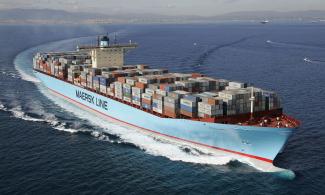
Maersk and Mediterranean, regarded as the second biggest shipping company globally say they have been unable to recoup their spending on fuel from the Bunker Adjustment Factor (BAF) - an additional levy on the cost of shipping, to cover for the fluctuating prices.

Though price of oil has been on the downward spiral in the past few days, it is still within 2014 level and shipping companies are complaining. Major shipping lines say the price of gasoline for ships- bunker fuel, has risen by 20% since the beginning of the year.
Leading shipping line, Maersk, say a new surcharge on the cost of importation will come into effect from the 1st of June, 2018 as a result.
Maersk and Mediterranean, regarded as the second biggest shipping company globally say they have been unable to recoup their spending on fuel from the Bunker Adjustment Factor (BAF) - an additional levy on the cost of shipping, to cover for the fluctuating prices.
In a statement to customers, Maersk said: “The increase (in bunker fuel prices) is more than 20 per cent compared with the beginning of 2018 and this unexpected development means that it is no longer possible for us to recover bunker costs through the standard bunker adjustment factors.”
In 2017, Nigeria spent N9.562 trillion on importation of goods.
In the same year, the country imported 13.91 billion liters of fuel.
The landing cost of fuel which was benchmarked at N171 for Q1 by the Petroleum Product Pricing Regulatory Agency (PPPRA), at $60, is expected to rise.
With current oil prices at $70, the landing cost of fuel is most likely in the N190 bracket, according to analysts.
The new surcharge, will lead to further increase in the price of importation of petrol as the cost of transportation of the commodity will go up. But Nigerians will not feel the impact of the price surge directly.
The Nigerian National Petroleum Corporation (NNPC), has been supplying petrol to retailers at N139 per litre for sale to consumers at the pump at N145.
The Corporation has been dipping into the funds it earned from sale of crude oil to subsidise the the price of petrol or to make up for what it has been describing as "under recovery" to be able to sell at the below the market price.
This has led to depletion in funds tendered by NNPC as earnings from sale of crude oil.
The reduction in revenue has led to a stalemate in the monthly meeting between officials of federal, state governments and NNPC for distribution of oil revenue twice this year due suspicion that the state owned oil company has not been transparent in the rendering of account of funds it earned from the sale of crude oil.
State governors, most of who depend on allocations from the revenue earned from sale of oil have initiated a thorough investigation into subsidy payments since 2015, in order to understand the new ‘under recovery’ regime.